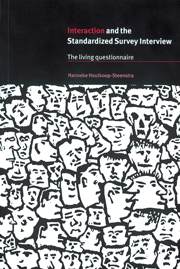Book contents
- Frontmatter
- Contents
- Preface
- Acknowledgments
- Glossary of transcript symbols
- 1 The standardized survey interview
- 2 Interviewer–respondent interaction
- 3 Participant roles
- 4 Recipient design
- 5 Questioning-turn structure and turn taking
- 6 Generating recordable answers to field-coded questions
- 7 Establishing rapport
- 8 Quality of Life assessment interviews
- 9 Implications for survey methodology
- Notes
- References
- Subject index
9 - Implications for survey methodology
Published online by Cambridge University Press: 22 September 2009
- Frontmatter
- Contents
- Preface
- Acknowledgments
- Glossary of transcript symbols
- 1 The standardized survey interview
- 2 Interviewer–respondent interaction
- 3 Participant roles
- 4 Recipient design
- 5 Questioning-turn structure and turn taking
- 6 Generating recordable answers to field-coded questions
- 7 Establishing rapport
- 8 Quality of Life assessment interviews
- 9 Implications for survey methodology
- Notes
- References
- Subject index
Summary
Introduction
I would like to begin this concluding chapter by quoting De Sola Pool. Although this quote is from 1957, it could well serve as a general conclusion for the present study. In his paper De Sola Pool criticizes the assumption that we can:
get rid of interpersonal effects so as to get at the truth which would be there if the interpersonal character of the interview didn't interfere. […] The social milieu in which the communication takes place modifies not only what a person dares to say but even what he thinks he chooses to say. And these variations in expressions cannot be viewed as mere deviations from some underlying “true” opinion, for there is no neutral, non-social, uninfluenced situation to provide that baseline. (191–2)
In this chapter I draw conclusions from the analyses of the “interpersonal character” of the interviews I have presented in this book. The first three sections briefly point out what I believe are the benefits of a CA approach to the study of standardized interviews. Section 4 presents some possible research questions based upon the findings of conversation analysis. Section 5 explains why interviewers should be allowed more flexibility than is currently granted to them by the rules of standardized interviewing. In the final section it will become clear that the costs of flexible interviewing are considerable, but whether or not the price is too high is a question that cannot be answered by survey methodology.
- Type
- Chapter
- Information
- Interaction and the Standardized Survey InterviewThe Living Questionnaire, pp. 174 - 184Publisher: Cambridge University PressPrint publication year: 2000



